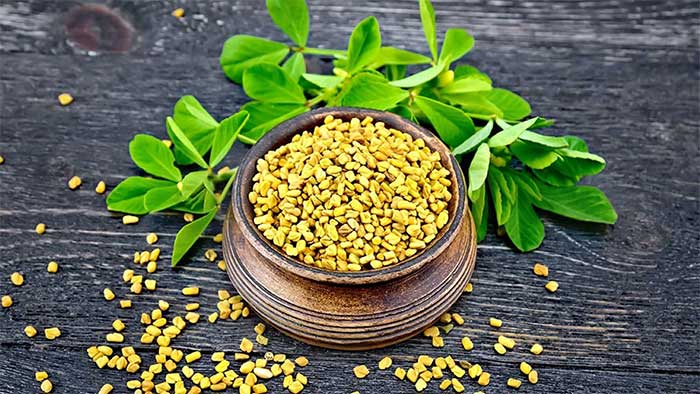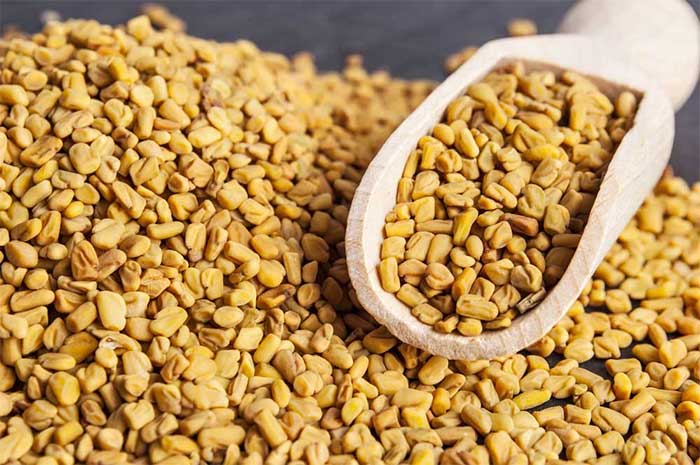Not only helps balance blood sugar levels, this plant is also a “natural enemy of cancer,” making it very beneficial for health.
What is Fenugreek?
Fenugreek, also known as Trigonella foenum-graecum, belongs to the legume family and originates from India. The plant typically grows wild in eastern Sri Lanka, Thailand, Australia, Vietnam, China, and Indonesia. This herb is rich in nutrients such as protein, fiber, iron, manganese, copper, magnesium, phosphorus, choline, galactagogues, saponins, and various vitamins, making it very good for health. Therefore, in addition to being used in cooking, the seeds, leaves, and stems of fenugreek are also an ancient herb used in the traditional medicine of many countries to help prevent various diseases and effectively boost health. However, fenugreek is not commonly used and is quite hard to find in Vietnam, so we can only purchase products derived from this plant.
Amazing Benefits of Fenugreek
1. Lowers Blood Sugar
Several studies have shown that fenugreek is an herb capable of naturally lowering blood sugar levels. Furthermore, the seeds of this plant are used by Indians in the treatment of diabetes.

Fenugreek seeds are rich in beneficial nutrients.
Accordingly, fenugreek seeds contain many beneficial nutrients, including mucilage, amino acids, saponins, and alkaloids, which help reduce blood sugar levels by decreasing the body’s carbohydrate absorption and regulating blood cholesterol levels.
In one study, type 1 diabetes patients consumed 50 grams of fenugreek seed powder at lunch and dinner. After 10 days, experts noted improved blood sugar levels and a reduction in bad LDL cholesterol. Another study published in the International Journal for Vitamin and Nutrition Research indicated that supplementing with 10 grams of fenugreek seeds soaked in hot water daily could help manage type 2 diabetes.
However, even though fenugreek seeds are beneficial for blood sugar, diabetes patients should be cautious and only use an appropriate amount, consulting with a doctor to achieve the best results.
2. Cancer Prevention
Research has shown that some nutrients in fenugreek are effective in cancer prevention. Not only do the fibers, but also the saponins and mucilage in this plant can help protect the mucous membranes of the colon from cancer. Trigonelline found in this plant has also been proven to reduce blood lipids, support kidney and liver function, and prevent cancer transformation.
3. Aids Digestion
Fenugreek is considered an effective remedy for treating digestive-related issues. A study published in Phytotherapy Research showed that individuals suffering from frequent heartburn and acid reflux who consumed a product containing extracts from this plant 30 minutes before meals for two weeks experienced a reduction in the severity of their heartburn.
Additionally, fenugreek can restore intestinal microbiota composition, thereby improving metabolic function and glucose tolerance, which has beneficial effects on other organ systems.

The seeds, leaves, and stems of fenugreek are also an ancient herb in medicine.
4. Improves Cardiovascular Health
Fenugreek is also very beneficial for cardiovascular health. The leaves of this plant are rich in soluble fiber, which helps reduce cholesterol absorption and enhances heart health, thereby lowering the risk of heart disease. A study on fenugreek powder also showed that galactomannan and a group of natural polysaccharides (soluble fiber) in this powder help promote heart function and reduce the risk of heart attacks.
5. Lactation Support
When discussing the health benefits of fenugreek, one cannot overlook its role in increasing milk production in postpartum women. In fact, this plant is often referred to as a “lactation miracle.” Numerous studies have indicated that this herb stimulates milk glands in women, significantly increasing milk production within 24 hours. This effect is due to the galactagogues in fenugreek seeds, which help stimulate the secretion of prolactin hormone—a hormone produced by the pituitary gland responsible for milk production. When prolactin levels rise, more milk is secreted.
6. Good for the Liver
In addition to the aforementioned benefits, fenugreek also helps nourish and protect the liver effectively. The compounds in this plant work by restoring the function of beta cells in the pancreas, reducing liver gluconeogenesis, as well as enhancing antioxidant enzymes and safeguarding the liver.


















































